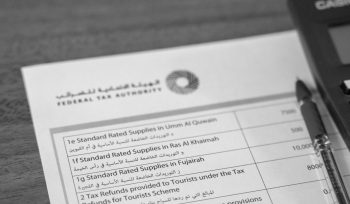Dubai’s new initiative offers residents exclusive discounts, low-interest mortgages, and early access to properties, making homeownership more accessible than ever.
The UAE Golden Visa for skilled employees offers a 10-year residency to professionals earning AED 30,000 or more per month, provided they meet educational, salary, and documentation requirements.
Understanding the difference between deductible and non-deductible expenses under UAE Corporate Income Tax can significantly impact your business’s tax liability and compliance.
Dubai’s Free Zones Council met to review new rules that would allow free zone companies to access mainland markets with additional permits, alongside plans to strengthen compliance and streamline services.
-
18 Jul 2025 Real EstateDubai Launches “Own Your First Home” Initiative for Residents
-
18 Jul 2025 DubaiUAE 10-Year Golden Visa for Skilled Employees: Complete Requirements Guide
-
18 Jul 2025 TaxDeductible vs. Non-Deductible Expenses in UAE Corporate Income Tax
-
11 Jul 2025 DubaiDubai Free Zones Council Reviews New Rules for Business Growth
-
11 Jul 2025 DubaiGuide to UAE Golden Visa with Bank Deposit
Dubai’s new initiative offers residents exclusive discounts, low-interest mortgages, and early access to properties, making homeownership more accessible than ever.
The UAE Golden Visa for skilled employees offers a 10-year residency to professionals earning AED 30,000 or more per month, provided they meet educational, salary, and documentation requirements.
Understanding the difference between deductible and non-deductible expenses under UAE Corporate Income Tax can significantly impact your business’s tax liability and compliance.
Dubai’s Free Zones Council met to review new rules that would allow free zone companies to access mainland markets with additional permits, alongside plans to strengthen compliance and streamline services.
The UAE Golden Visa bank deposit route offers a secure path to 10-year residency with just AED 2 million.
Growing UAE-Germany trade and 100% ownership opportunities are creating ideal conditions for German businesses to establish in the UAE.
As top private equity firms establish offices in the UAE, local businesses stand at the doorstep of major investment, provided they meet international standards in structure, compliance, and transparency.
A detailed checklist of requirements, property criteria, and application steps to help investors secure the UAE’s 10-year property investment golden visa.
With mobile shopping now dominating over a third of all online purchases in the UAE, entrepreneurs have a prime opportunity to launch digital commerce ventures in a market built for growth and innovation.





